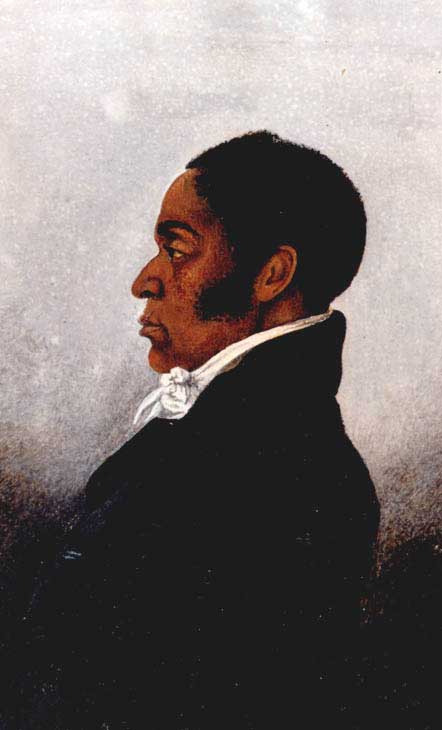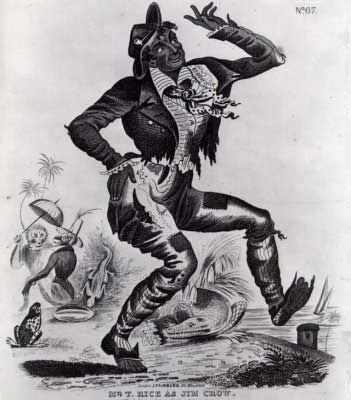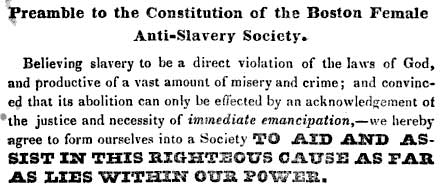7.7: Race and Jacksonian Democracy
- Page ID
- 86142
Race and Jacksonian Democracy
More than anything else, however, it was racial inequality that exposed American democracy’s limits. Over several decades, state governments had lowered their property requirements so poorer men could vote. But as northern states ended slavery, whites worried that free black men could also go to the polls in large numbers. In response, they adopted new laws that made racial discrimination the basis of American democracy.
At the time of the Revolution, only two states explicitly limited black voting rights. By 1839, almost all states did. (The four exceptions were all in New England, where the Democratic Party was weakest.) For example, New York’s 1821 state constitution enfranchised nearly all white male taxpayers but only the richest black men. In 1838, a similar constitution in Pennsylvania prohibited black voting completely.
The new Pennsylvania constitution disenfranchised even one of the richest people in Philadelphia. James Forten (Figure 40), a free-born sailmaker who had served in the American Revolution, had become a wealthy merchant and landowner. He used his wealth and influence to promote the abolition of slavery, and now he undertook a lawsuit to protect his right to vote. But he lost, and his voting rights were terminated. An English observer commented sarcastically that Forten wasn’t “white enough” to vote, but “he has always been considered quite white enough to be taxed.”

Watercolor by an unknown artist of abolitionist James Forten (1766-1842) believed to have been painted during his lifetime. The image comes from The Historical Society of Pennsylvania.
During the 1830s, furthermore, the social tensions that had promoted Andrew Jackson’s rise also worsened race relations. Almost 400,000 free blacks lived in America by the end of the decade. In the South and West, Native Americans stood in the way of white expansion. And the new Irish Catholic immigrants, along with native working-class whites, often despised nonwhites as competitors for scarce work, housing, and status.
Racial and ethnic resentment thus contributed to a wave of riots in American cities during the 1830s. In Philadelphia, thousands of white rioters torched an antislavery meeting house and attacked black churches and homes. Near St. Louis, abolitionist newspaper editor Elijah Lovejoy was murdered as he defended his printing press. Contemplating the violence, another journalist wondered, “Does it not appear that the character of our people has suffered a considerable change for the worse?”
Racial tensions also influenced popular culture. The white actor Thomas Dartmouth Rice appeared on stage in blackface, singing and dancing as a clownish slave named “Jim Crow.” (Figure 41) Many other white entertainers copied him. Borrowing from the work of real black performers but pandering to white audiences’ prejudices, they turned cruel stereotypes into one of antebellum America’s favorite forms of entertainment.

Some whites in the 1830s, however, joined free black activists in protesting racial inequality. Usually, they lived in northern cities and came from the class of skilled laborers, or in other words, the lower middle class. Most of them were not rich, but they expected to rise in the world.
In Boston, for example, the Female Anti-Slavery Society (Figure 42) included women whose husbands sold coal, mended clothes, and baked bread, as well as women from wealthy families. In the nearby village of Lynn, many abolitionists were shoemakers. They organized boycotts of consumer products like sugar that came from slave labor, and they sold their own handmade goods at antislavery fundraising fairs. For many of them, the antislavery movement was a way to participate more in “respectable” middle-class culture—a way for both men and women to have a say in American life.

Debates about slavery, therefore, reflected wider tensions in a changing society. The ultimate question was whether American democracy had room for people of different races as well as religions and classes. Some people said yes and struggled to make American society more welcoming. But the vast majority, whether Democrats or Whigs, said no. (3)
Sound-Scape
An excerpt from Andrew Jackson’s first inaugural address, delivered in 1829, is the focus of the Module 5 sound-scape. In it, Jackson reflects on the overwhelming responsibilities that come with the presidency, as well as his views on what the role of president entails. 1
Listen to President Andrew Jackson’s first inaugural address as the 7th President of the United States and follow along with the text.
Click on the audio player to listen.
An audio element has been excluded from this version of the text. You can listen to it online here: http://pb.libretexts.org/ush/?p=104
President Andrew Jackson’s First Inaugural Address
Fellow citizens,
About to enter upon the duties to which as President of the United States, I have been called by voluntary suffrages of my country, I avail myself of this occasion to express the deep and heartfelt gratitude with which a testimonial of such distinguished favor has been received. To be elected under the circumstances which have marked the recent contest of opinion to administer the affairs of a government deriving all its powers from the will of the people, a government whose vital principle is the right of the people to control its measures, and whose only object and glory are the equal happiness and freedom of all the members of the confederacy, cannot but penetrate me with the most powerful and mingled emotions of thanks, on the one hand, for the honor conferred on me, and on the other, of solemn apprehensions for the safety of the great and important interests committed to my charge.
Under the weight of these emotions, unaided by any confidence inspired by past experience, or by any strength derived from the conscious possession of powers equal to the station, I confess, fellow citizens, that I approach it with trembling reluctance. But my Country has willed it, and I obey, gathering hope from the reflection that the other branches of the Govt. with whom the constitutional will associates me, will yield those resources of Patriotism and intelligence, by which the administration may be rendered useful, and the honor and independence of our widely extended Republic guarded from encroachment; but above all, trusting to the smiles of that overruling Providence, “in the hollow of whose hand,” is the destiny of nations, for that animation of common council and harmonizing effort, which shall enable us to steer, the Bark of liberty, through every difficulty.
Jackson’s First Inaugural Address: A Transcript by Library of Congress is in the Public Domain
- Authored by: Florida State College at Jacksonville. License: CC BY: Attribution
- The American YAWP. Located at: http://www.americanyawp.com/. License: CC BY-SA: Attribution-ShareAlike

